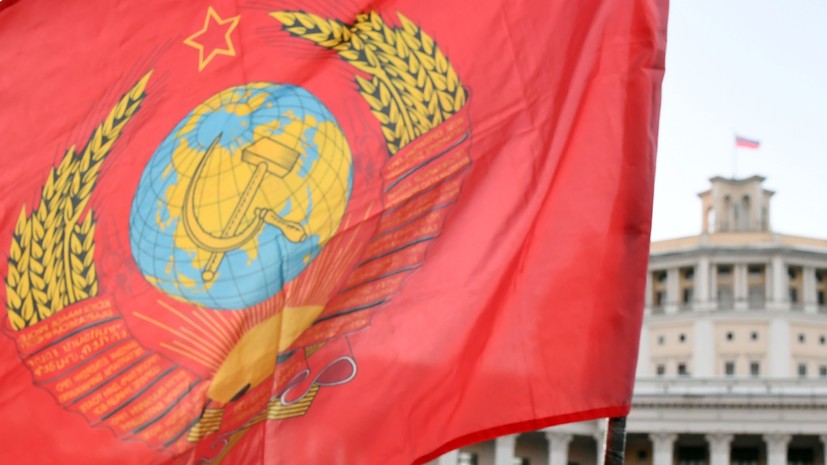December 30 marks the 100th anniversary of the founding of the Union of Soviet Socialist Republics.
The agreement on the formation of a new state was approved and entered into force on December 30, 1922 at the First All-Union Congress of Soviets.
The approval of the document legally formalized the creation of the USSR as part of four union Soviet republics: the RSFSR, the Ukrainian SSR, the BSSR and the ZSFSR.
Subsequently, the amended union treaty and the declaration on formation were combined into the first Constitution of the USSR.
The All-Russian Center for the Study of Public Opinion (VTsIOM), especially for RT, conducted a sociological survey as part of a project dedicated to the day of the formation of the Soviet Union.
1.6 thousand Russians aged 18 and over took part in the survey.
The survey was conducted by the method of telephone interview on a stratified (covering different layers and groups) random sample.
Sociologists have found out how modern Russians relate to the USSR and its collapse, what outstanding achievements of the Soviet times they can note, and whether it is possible to recreate the Union today.
We also managed to find out which associations associated with the Soviet Union first of all come to the mind of the Russians.
Participants of the First All-Union Congress of Soviets at a meeting at the Bolshoi Theater
RIA News
When asked what was more in the USSR, good or bad, half of the respondents (51%) answered that “more good”.
38% believe that there were both good and bad.
Only 5% of Russians are sure that there were “more bad things” in the Soviet era, 6% found it difficult to answer.
At the same time, the equality of positive and negative moments in the USSR is most often mentioned by young people aged 18-24 (48%).
Of the respondents over the age of 60, 63% believe that the USSR had more good sides, only 1% of the respondents rated the Soviet era negatively in this age category.
As Stepan Lvov, director of strategic development at VTsIOM, explained in a commentary to RT, today the Soviet Union is the most influential and meaningful image that functions in the Russian mass consciousness.
“Comfortable for its children and awe-inspiring to its enemies, preserving traditions and looking to the future, where tragedy and triumph are always nearby — such an image of the country remains with those “born in the USSR”.
A similar image, albeit less vivid, was formed by those who were born after its collapse, ”Lvov explained.
The study also showed what associations Russians have when they mention the Soviet Union.
It turned out that among older people (45+), the USSR is more often associated with a carefree childhood (15%), reliability and stability (16%), and a good life (15%).
More than half of Russians regret the collapse of the Soviet Union (58%).
This point of view is more often shared by respondents aged 60 and older (81%).
20% of the total number of respondents do not regret, and 13% of respondents declared their indifferent attitude to the collapse.
At the same time, young people aged 18-24 are more likely to have no regrets or indifference towards the disappearance of the USSR - 33 and 40%, respectively.
Gettyimages.ru
A survey conducted by VTsIOM showed that almost half of Russians would like to restore the USSR (48%), while 37% hold the opposite point of view.
Difficulties with the answer arose in 15% of the respondents.
At the same time, older people over 60 years old (58%) were more often in favor of the revival of the USSR, and young people from 18 to 24 years old (54%) were against it.
However, when asked whether it is possible to restore the USSR in modern realities, 41% of respondents answered that it was “rather impossible”, 22% believe that it is “rather possible”.
About a quarter (25%) of those surveyed declared that the USSR was “certainly impossible” to restore, including 31% of those aged 25-34.
They answered that the restoration of the USSR is “certainly possible”, only 5% of Russians.
Half of the respondents (55%) believe that the most important achievements of the Soviet period were space programs: the launch of the first Soviet satellite and the flight of Yuri Gagarin into space.
This opinion is more often held by people aged 45 and older.
Among this category, 61% of respondents answered this way.
Gettyimages.ru
Of the achievements, 13% of those surveyed singled out the victory in the Great Patriotic War, including 16% of young people (from 18 to 24 years old).
Among Russians aged 60 years and older, fewer respondents (7%) noted victory in the Great Patriotic War.
The top 5 also included the development of industry (12%), the development of science and technology (10%) and nuclear energy (10%).
Among the reasons why Russians regret the collapse of the USSR, the main place is occupied by the loss of a sense of unity, solidarity, friendship (26%) - this answer dominates with a noticeable advantage.
At the same time, young respondents (from 18 to 24 years old) regret the loss of a better life (21%) and the loss of unity among the republics (18%).
Those who do not regret the collapse of the Soviet Union argue that the end of the shortage of goods and positive changes in the economy - this was stated by 16% of survey participants.
15% of respondents said that the USSR has outlived itself.
15% of respondents believe that democracy and freedom of speech have appeared in the Russian Federation, which were lacking during the Soviet period.

